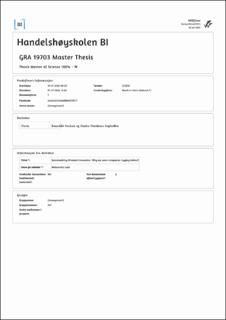Sustainability-Oriented Innovation: Why are some companies lagging behind? A comparative case study
Master thesis
Permanent lenke
https://hdl.handle.net/11250/3040354Utgivelsesdato
2022Metadata
Vis full innførselSamlinger
- Master of Science [1621]
Sammendrag
Sustainability is arguably the biggest trend in business today and represents one of
the greatest challenges humanity has ever faced. Consequently, companies are
faced with mounting pressure from multiple stakeholders to be more aware of and
handle the social and environmental impacts of their business activities. To succeed
with the green transition, we need more sustainability-oriented innovation (SOI).
Many companies assign considerable resources to SOI and launch important
innovations on a regular basis. However, there are also laggards, and we have
limited knowledge on why some companies lag behind. The purpose of this thesis
is to provide some preliminary answers to this important question by exploring the
following research question:
Why are some companies’ laggards in relation to sustainability-oriented
innovation?
To answer this question, we reviewed the literature on SOI and performed a
comparative case study of a leading and a lagging company. The research process
consists of two phases, and a combination of deductive and inductive approaches
was applied. We started deductively by developing managerial implications from
the existing SOI literature, resulting in a novel normative framework. Secondly,
primary data for our comparative case study analysis was gathered through semistructured
interviews with key informants from both companies. The interviews
were informed by the normative framework. For the second phase, we combined
deductive and inductive reasoning. First, we use the normative framework to
analyze the data from the first round of interviews. Subsequently, we used a
grounded theory approach to come up with new insights through a second round of
interviews.
Our proposed normative framework provides managers with a tool to identify
concrete weaknesses and areas of improvements in relation to SOI. Moreover, the
empirical findings represent knowledge and insights which can support managers
in prioritizing their SOI efforts to truly become more sustainable and tackle the
challenges of the future.
In addition, our study provides several theoretical contributions. Firstly, the
normative framework can support scholars in identifying gaps and thereby
III
opportunities for future research on SOI. Secondly, based on a theoretical analysis,
we present two conceptual contributions to the SOI literature by suggesting that
absorptive capacity and psychological safety should be included as key concepts.
Thirdly, our empirical findings add important insights into the SOI literature and
highlights three central elements to why some companies lag being in terms of SOI.
The first is the lack of sustainability integration. In relation to this point, we provide
insight into the importance of hiring & training practices as well as the strategic
positioning of companies. Secondly, our findings suggest that the lack of
collaborative efforts can be central in answering our research question. Here we
make important cross-industrial considerations and provide insights into the
relevance of employee’s attitudes and mindset. Lastly, by utilizing Schein’s model
for organizational culture, we add important insights to the cultural discussion in
the SOI literature. We suggest that an underlying reason why companies lag behind
in relation to SOI, is the absence of sustainability at the lowest level of the corporate
culture – the basic underlying assumptions of the culture. This finding represents a
novel contribution as Schein’s model has yet to be applied in the context of SOI.
We hope scholars will continue exploring the role of culture and cultural
assumptions in future research. We believe that new insights in this area have great
potential in improving our knowledge of why some companies are leaders on SOI
and others lag behind.
Beskrivelse
Masteroppgave (MSc) in Master of Science in Entrepreneurship and Innovation - Handelshøyskolen BI, 2022
